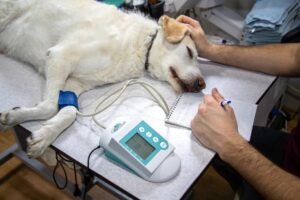There are many reasons why a dog might shiver, including being cold, experiencing pain or discomfort, and feeling fearful or anxious. In this article, we’ll explore some of the common causes of shivering in dogs and discuss what you can do to help your furry friend feel more comfortable. Regardless of the cause, it’s important to pay attention to your dog’s body language and behavior, as shaking can be a sign that something is not quite right.
9 Common Reasons for shivering
There are several reasons why a dog may shiver or tremble. Some common causes include:
Cold temperatures

Dogs can shiver when they are cold as a way to generate heat and warm their bodies. Shivering is a natural reflex that helps to increase muscle activity and raise the body’s core temperature. Dogs have a thicker coat of fur than humans, which helps to keep them warm in cold weather, but they can still become chilled if they are exposed to cold temperatures for too long. If your dog is shivering due to cold temperatures, it is important to bring them inside or provide them with extra warmth, such as a blanket or sweater.
Fear or anxiety

Dogs can shiver due to anxiety or fear as a physical manifestation of their emotional state. Shivering can be a response to a perceived threat or an expression of stress or anxiety. In addition to shivering, dogs may also exhibit other signs of anxiety or fear, such as panting, whining, hiding, or shaking. It’s important to pay attention to your dog’s body language and behavior to try to understand what they are feeling and how to best support them. If you are concerned about your dog’s shivering or other behavior, it is a good idea to consult with a veterinarian or a professional dog trainer for guidance.
Pain
Shivering can be a sign of discomfort or pain in dogs. Other signs of pain in dogs can include lethargy, reluctance to move, difficulty in breathing, and changes in behavior. If you think your dog is in pain, it is important to consult with a veterinarian for a proper diagnosis and treatment plan. The veterinarian will be able to determine the cause of the pain and recommend the appropriate treatment.
Excitement
A dog can shiver or tremble due to excitement or arousal. This is a normal response and is not necessarily a cause for concern. However, it’s important to observe your dog’s behavior and look for other signs that might indicate a more serious issue. If your dog is shaking or trembling excessively, or if the shaking is accompanied by other signs of distress such as whining, panting, or vomiting, it’s a good idea to consult your veterinarian for further evaluation. Some dogs will shiver when they are excited, especially if they are excited to go for a walk or play.
Low Blood Pressure

It is possible that a dog could be shivering due to low blood pressure. Low blood pressure, or hypotension, can be caused by some factors, including dehydration, shock, and certain medications. In dogs, hypotension can cause weakness, lethargy, and shivering. If your dog is shivering and you suspect that it may be due to low blood pressure, it is important to consult with a veterinarian as soon as possible. The veterinarian will be able to determine the cause of the low blood pressure and recommend the appropriate treatment.
Poisoning
If your dog is shivering due to poisoning, it is a medical emergency and you should seek immediate veterinary care. In the meantime, try to remove any remaining source of the poison if it is safe to do so, and keep a close eye on your dog’s symptoms. If you know or suspect that your dog has ingested poison, try to bring a sample of the substance with you to the veterinarian and bring along any information you have about the product, such as the label or packaging. This will help the veterinarian determine the best course of treatment for your dog.
Seeking attention
Your dog may be shivering to seek attention. Dogs are social animals and they often crave attention and affection from their owners. If your dog has learned that shivering gets them attention from you, they may continue to do it to get your attention. It’s important to make sure that your dog is comfortable and not in any distress, but if they are just looking for some extra love, it can be helpful to give them some extra cuddles and attention to let them know that you care.
Aging
Shivering in dogs can have a variety of causes, and age can be a factor in some cases. For example, older dogs may shiver as a result of arthritis or other age-related issues that cause pain or discomfort. Shivering can also be a symptom of other health problems, such as infections, organ diseases, or even psychological disorders. It’s important to have your dog examined by a veterinarian if you notice that they are shivering, as this can be a sign of an underlying problem that needs to be addressed.
Nausea
A dog can shiver due to nausea, but there could be other reasons for shivering as well. Some possible causes of nausea in dogs include motion sickness, ingestion of something toxic or inedible, digestive issues, and certain medical conditions. If your dog is shivering and exhibiting other signs of nausea, such as vomiting or loss of appetite, it is important to consult a veterinarian for a proper diagnosis and treatment.
Canine Distemper
Canine distemper is a viral disease that affects a dog’s respiratory, gastrointestinal, respiratory, and central nervous systems. One of the signs of distemper is shivering or tremors, which can be caused by inflammation of the brain and spinal cord. The virus is highly contagious and can be spread through the air or by contact with contaminated objects. It is important to get your dog vaccinated against distemper to help prevent the spread of this disease.
What to do if the dog is shivering due to anxiety?
If your dog is shivering due to anxiety, there are a few things you can try to help calm them down:
- Remove the source of anxiety, if possible. For example, if your dog is afraid of thunder, try to bring them inside or to a quieter, safer place during a storm.
- Provide comfort and reassurance. Try petting your dog gently and speaking to them in a soothing voice. You could also try using a calming product like a thunder shirt, which is a type of garment that applies gentle, constant pressure to help calm anxious dogs.
- Distract your dog. Try engaging your dog in a fun activity, like playing a game or going for a walk. This can help take their mind off of whatever is causing their anxiety.
- Consult with a veterinarian or a professional dog trainer. They may be able to recommend additional strategies or suggest medication to help your dog manage their anxiety.
It’s important to remember that it’s normal for dogs to experience anxiety from time to time, and there are many ways to help them cope with it. However, if your dog’s anxiety is severe or persistent, it’s important to seek help from a professional.
What to do if the dog is trembling due to a cold?
If your dog is shivering due to the cold, there are a few things you can do to help them stay warm and comfortable:
- Bring them inside: If it’s cold outside, bring your dog inside where it’s warm. This is especially important if they are shivering or have thin fur.
- Add layers: If your dog has a thin coat, consider adding a sweater or coat to help them stay warm.
- Provide a warm place to sleep: Make sure your dog has a warm, comfortable place to sleep, such as a dog bed with a blanket or a warm crate.
- Offer warm liquids: You can also try offering your dog warm water or broth to help warm them up from the inside.
- Consult a veterinarian: If your dog is shivering excessively or showing other signs of illness, it’s important to consult a veterinarian for proper medical care.
What to do if the dog is shivering due to pain?
If your dog is shivering due to pain, you should take it to the veterinarian as soon as possible. The shivering could be a sign of a serious medical condition that needs to be treated. In the meantime, you can try to keep your dog as comfortable as possible by providing a warm and cozy place for it to rest, and by giving it any prescribed medications. It’s important not to give your dog any over-the-counter or home remedies without first consulting a veterinarian.
FAQ
Why does my dog keep shaking his head?
There are a few possible reasons why your dog might be shaking their head. It could be that they have something stuck in their ear or that they are experiencing an ear infection or allergy. It could also be that they are trying to shake off water or dirt from their coat, or that they are trying to shake off an irritant such as an insect. In some cases, head shaking can also be a sign of pain or discomfort.
Why is my dog shaking after surgery?
It is not uncommon for dogs to shake or shiver after surgery due to discomfort or pain. In some cases, shaking or shivering may be due to the effects of anesthesia. It is important to contact your veterinarian if you are concerned about your dog’s shaking after surgery. They will be able to assess your dog’s condition and provide appropriate care.


